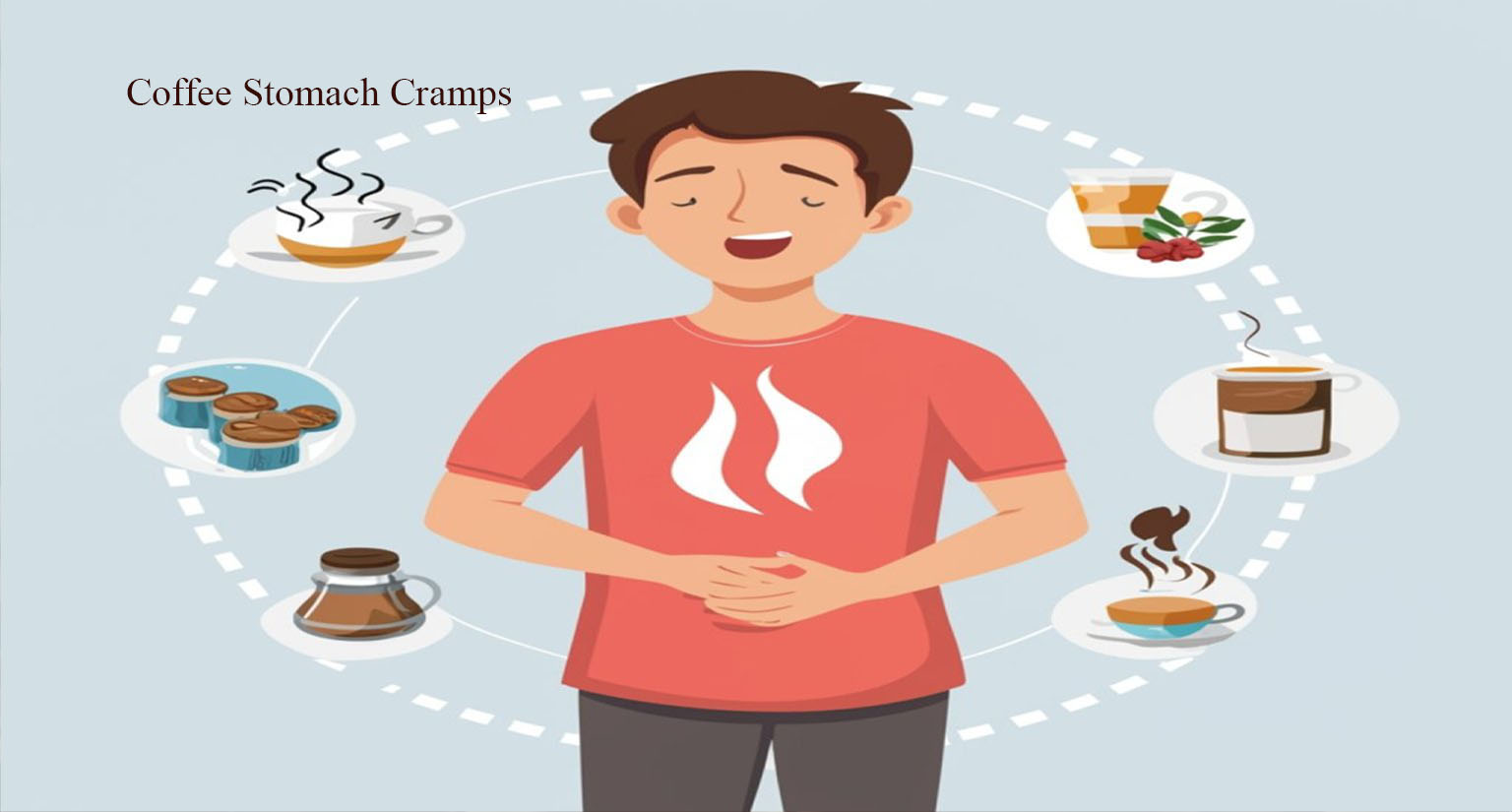Coffee Stomach Cramps Causes, Remedies for Relief
Coffee, a beloved morning ritual for many, can sometimes lead to an unpleasant experience: coffee stomach cramps. Understanding the relationship between coffee consumption and these discomforts is crucial.
Whether you’re a daily coffee enthusiast or an occasional sipper, discovering how to mitigate these cramps can significantly improve your coffee experience.
What Helps Alleviate Stomach Aches Caused by Coffee?
Experiencing stomach aches after enjoying your favorite cup of coffee can be disheartening. Fortunately, there are strategies to minimize and alleviate this discomfort, ensuring your coffee ritual remains a pleasurable experience.
Here are detailed insights on what helps combat stomach aches caused by coffee:
Gradual Adjustment
For individuals sensitive to the effects of coffee on the stomach, a gradual adjustment to caffeine intake can make a significant difference.
Start by reducing the size of your coffee servings or switch to low-acid coffee options.
This gradual approach allows your digestive system to adapt to the stimulating effects of caffeine, minimizing the likelihood of stomach cramps.
Quality Matters
The quality of your coffee beans plays a crucial role in how your stomach reacts to your brew.
Option for high-quality, freshly ground coffee beans. Inferior or stale coffee may contain oils that have gone rancid, contributing to digestive discomfort.
Choosing premium coffee ensures a smoother, more enjoyable coffee experience without the unpleasant side effects.
Decaf or Alternatives
If the caffeine content in regular coffee is a known trigger for stomach cramps, consider switching to decaffeinated options.
Decaf coffee provides the rich flavor without the stimulating effects of caffeine. Additionally, explore alternative beverages such as herbal blends or teas that offer a gentler energy boost without causing digestive distress.
By implementing these strategies, you can continue savoring your coffee without worrying about the discomfort of stomach cramps.
Experimenting with these approaches allows you to find the balance that suits your individual tolerance and enhances your overall coffee-drinking experience.
Can Coffee Cause Stomach Pains?
Coffee is a beloved beverage enjoyed by many for its rich flavors and stimulating effects, it can, for some, lead to unwelcome stomach discomfort.
Understanding the factors contributing to these pains is crucial for a more enjoyable coffee experience.
Causes of Coffee-Induced Stomach Pains
- Acidity: Coffee is naturally acidic due to compounds like chlorogenic acid. This acidity can irritate the stomach lining, leading to discomfort or pains, particularly for individuals susceptible to acid reflux, gastritis, or other digestive sensitivities.
- Caffeine Sensitivity: The caffeine content in coffee acts as a stimulant. For some people, especially those with a heightened sensitivity to caffeine, it can prompt digestive distress, causing cramping, bloating, or abdominal pains.
- Compounds in Coffee: Certain compounds in coffee, such as chlorogenic acid, have been linked to increased stomach acid production or triggering stomach contractions, which might contribute to discomfort or pains in some individuals.
- Quality Matters: Stale or low-quality coffee beans can be problematic. Oils within these beans might turn rancid, exacerbating stomach discomfort due to the breakdown of these oils. Opting for high-quality, freshly ground coffee can alleviate this issue.
- Overconsumption: Drinking excessive amounts of coffee, especially on an empty stomach, can overwhelm the digestive system. This overload can lead to increased acidity, irritation, and spasms in the stomach, resulting in cramps, pains, or general discomfort.
These potential causes vary from person to person. Identifying the specific triggers for your coffee-induced stomach pains can involve observing your body’s reactions, experimenting with different coffee types, adjusting intake levels, and possibly consulting a healthcare professional for guidance.
Can Coffee Lead to Stomach Cramps and Gas?
For some individuals, the enjoyment of coffee may occasionally coincide with stomach cramps and gas, prompting discomfort. Understanding the relationship between coffee consumption and these digestive issues is essential for a more comfortable coffee experience.
Various factors contribute to the possibility of coffee causing stomach cramps and gas:
Reasons for Induced Coffee Stomach Cramps, and Gas
Acidity and Irritation
Coffee’s natural acidity can irritate the stomach lining, leading to cramps. This irritation might also contribute to an increase in gas production, causing bloating or discomfort.
Caffeine’s Effects
Caffeine, a stimulant present in coffee, can accelerate gut motility, leading to faster transit of food through the digestive system. This rapid movement can sometimes result in cramps and increased gas production.
Stimulation of Stomach Acid
Coffee consumption might stimulate the production of stomach acid, potentially leading to increased gas formation or aggravating existing stomach issues.
Alteration of Gut Microbiota
Coffee consumption can impact the balance of gut bacteria, potentially leading to changes in digestion and gas production, which, in turn, might cause cramps.
Sensitivities
Some individuals might have specific sensitivities to compounds in coffee, leading to digestive discomfort, including cramps and increased gas.
Understanding these potential factors can help individuals experiencing stomach cramps and gas after consuming coffee to identify triggers and make informed choices.
Experimenting with different coffee types, brewing methods, or considering alternatives can aid in minimizing discomfort while still enjoying coffee’s flavor and benefits.
What Elements Contribute to Stomach Upset in Coffee?
Coffee, while beloved for its rich flavor and energizing effects, can sometimes lead to stomach upset for certain individuals.
Understanding the specific elements in coffee that contribute to these discomforts is crucial for making informed choices and enjoying your coffee without digestive issues.
Elements in Coffee that Can Upset the Stomach:
Caffeine
As a stimulant, caffeine can increase stomach acid production and accelerate gut motility. For some individuals, these effects may result in stomach upset, cramps, or a feeling of discomfort.
Oils in Coffee
Coffee beans contain natural oils that can go rancid over time, especially in low-quality or stale coffee. These rancid oils may contribute to digestive distress and upset the stomach.
Compounds and Microbiota
Coffee consumption can impact the balance of gut bacteria, leading to changes in digestion. This alteration in gut microbiota might be a contributing factor to stomach upset in some individuals.
Specific Compounds
Some compounds in coffee, aside from caffeine, may have individual reactions with certain stomach sensitivities. Identifying these specific compounds can help tailor coffee choices to minimize stomach upset.
By understanding these elements, coffee enthusiasts can make informed decisions about their coffee selection, brewing methods, and intake levels to minimize the likelihood of stomach upset.
Experimenting with different coffee types and considering alternative options may also provide a more enjoyable coffee experience for those prone to digestive sensitivities.
Stomach Pain After Drinking Coffee on an Empty Stomach
Experiencing stomach pain after savoring that morning cup of coffee on an empty stomach can be quite discomforting. Understanding the reasons behind this phenomenon is essential to ensure a pleasant start to your day without unwelcome digestive distress.
Possible Causes of Stomach Pain After Consuming Coffee on an Empty Stomach:
–Increased Acidity: Coffee is naturally acidic, and consuming it on an empty stomach can lead to heightened acidity. This increased acidity may irritate the stomach lining, causing pain or discomfort.
–Stimulation of Stomach Acid: Coffee consumption stimulates the production of stomach acid. On an empty stomach, this can result in a more pronounced increase in gastric acid levels, potentially leading to stomach pain.
–Accelerated Gut Motility: Caffeine, a key component of coffee, acts as a stimulant that can accelerate gut motility. On an empty stomach, this increased movement may lead to cramps or pain as the digestive system processes the coffee more rapidly.
–Dehydration: Coffee is a diuretic, which means it can contribute to increased urine production and potential dehydration, especially on an empty stomach. Dehydration may exacerbate stomach pain and discomfort.
–Sensitivity to Caffeine: Individuals vary in their sensitivity to caffeine. For some, consuming coffee on an empty stomach can trigger stomach pain due to heightened sensitivity to the stimulating effects of caffeine.
By understanding these potential causes, you can take steps to mitigate stomach pain when enjoying your morning coffee on an empty stomach. Consider having a small snack before your coffee, opting for lower-acid coffee varieties, or experimenting with alternative morning beverages to find a routine that suits your individual digestive needs.
Frequently Asked Questions (FAQs)
1. Why does coffee sometimes cause stomach pains?
Coffee’s natural acidity and caffeine content can irritate the stomach lining, leading to discomfort or pains, especially for those prone to acid reflux or sensitivity to caffeine. Additionally, compounds in coffee may prompt stomach contractions or increase stomach acid production, contributing to pains for some individuals.
2. How can I prevent stomach cramps after drinking coffee?
Gradually adjusting your coffee intake, opting for high-quality beans, trying low-acid options, considering decaffeinated alternatives, or having a small snack before drinking coffee may help alleviate or prevent stomach cramps associated with coffee consumption.
3. Is it better to drink coffee on an empty stomach or after eating?
For some individuals, consuming coffee on an empty stomach can lead to heightened acidity, increased stomach acid production, or accelerated gut motility, potentially causing discomfort. Having coffee after eating or alongside a small meal may reduce the likelihood of experiencing stomach issues.
4. What are the specific elements in coffee that upset the stomach?
Coffee’s acidity, caffeine content, oils in the beans, impact on gut microbiota, and individual sensitivities to certain compounds contribute to stomach upset.
These elements can irritate the stomach lining, increase stomach acid, or alter digestion, leading to discomfort for some coffee drinkers.
5. Can I still enjoy coffee if it upsets my stomach?
Yes, there are various strategies to minimize stomach discomfort while still enjoying coffee. Experimenting with different coffee types, brewing methods, opting for lower-acid options, or considering alternatives like decaf or herbal blends can help you find a balance that suits your individual digestive needs.







